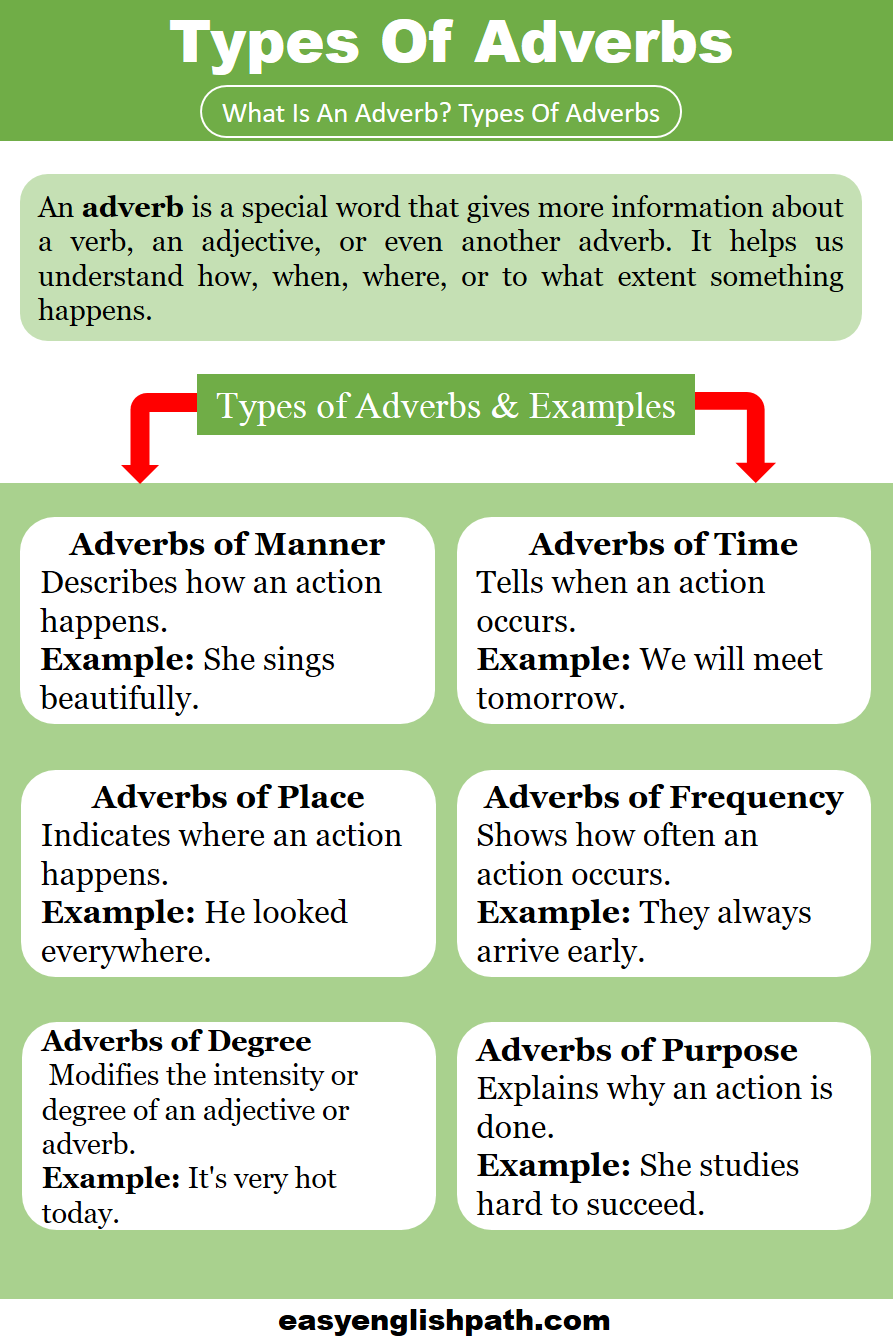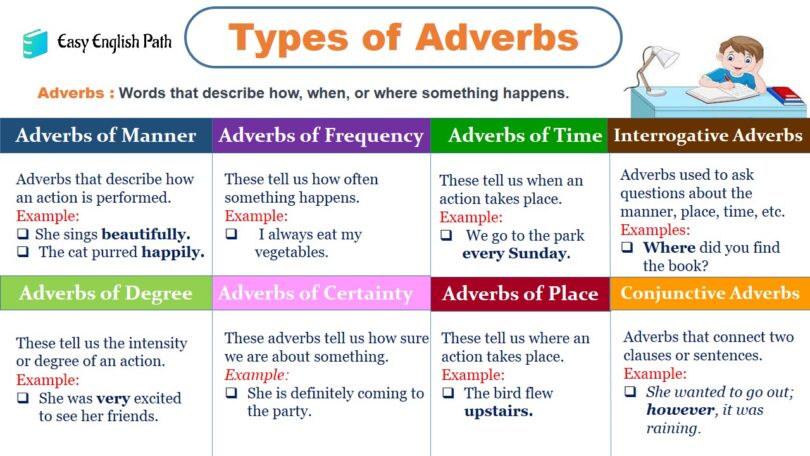Adverbs are Used to add more information to actions. They tell us how something is done when it happens, where it happens, and how much. Today, we’re going to learn about different types of adverbs. They make sentences more interesting!

What are Adverbs?
Adverbs are used to modify verbs, adjectives, or other adverbs, they provide additional information about how, when, where, or to what degree an action is performed. Adverbs are used to enhance the meaning of a sentence by providing details about how an action occurs
- The cat is sitting upstairs.
- We looked everywhere for the keys.
- He travels abroad frequently.
Types of Adverbs
- Adverbs of Manner
- Adverbs of Place
- Adverbs of Frequency
- Adverbs of Time
- Adverbs of Degree
- Adverbs of Probability
- Demonstrative Adverbs
- Interrogative Adverbs
- Relative Adverbs
- Conjunctive Adverbs
1. Adverbs of Manner
Adverbs of manner are words that are used to describe how an action is performed. They provide more information about how an action takes place, adding detail to verbs.
- He handled the fragile glassware carefully.
- The music played loudly at the party.
She sang the song beautifully. - She ran quickly to catch the bus.
2. Adverbs of Place
Adverbs of place are used to give details about the location or position of an action These adverbs answer the question Where?.
- Please come here.
- The book is there on the shelf.
- We will meet you there.
- I searched everywhere for my keys.
- The children left toys everywhere.
3. Adverbs of Frequency
Adverbs of frequency are words that are used to describe how often an action occurs. These adverbs help convey whether an action happens all the time, sometimes, rarely, or never.
- I always brush my teeth before going to bed.
- She usually takes the bus to work.
- They often go to the movies on weekends.
4. Adverbs of Time
Adverbs of time describe when an action happens. They provide information about time, frequency, or duration.
- She will finish her work today.
- We are going to the park today.
- They will arrive tomorrow.
- I have a meeting tomorrow.
5. Adverbs of Degree
Adverbs of degree modify adjectives or other adverbs to show intensity or extent.
- It’s too hot in here.
- The food was so delicious.
- The job is quite challenging.
- The dress is rather expensive.
6. Adverbs of Probability
Adverbs of probability show how certain or uncertain an action is.
- It will probably rain later.
- They will likely arrive on time.
- It’s unlikely that he will win the lottery.
7. Demonstrative Adverbs
Demonstrative adverbs indicate location or direction of an action.
- Put the keys here on the table.
- We will meet here tomorrow.
- I left your book there on the shelf.
- The movie is starting now.
8. Interrogative Adverbs
Interrogative adverbs are used to ask questions.
- Where did they find the lost keys?
- When did you last visit the museum?
- How did you solve the problem?
9. Relative Adverbs
Relative adverbs introduce a relative clause and provide information about a noun.
- The park where we used to play is now a shopping center.
- The day when we met was unforgettable.
- He explained the reason why he was late.
10. Conjunctive Adverbs
Conjunctive adverbs link independent clauses and show relationships between them.
- He studied hard; therefore, he aced the exam.
- She wanted to go out; however, it was raining heavily.
- They were tired; nevertheless, they continued working.
Adverb vs Adjective
| Feature | Adverb | Adjective |
|---|---|---|
| Function | Modifies verbs, adjectives, or other adverbs | Modifies nouns or pronouns |
| Answers | How? When? Where? To what extent? | What kind? Which one? How many? |
| Example | She runs quickly. (modifies verb “runs”) | She is a quick runner. (modifies noun “runner”) |
| Placement | Usually before or after the word it modifies | Usually before the noun it modifies |
| Common Suffixes | -ly (quickly, slowly, happily) | -y, -ous, -ive (happy, dangerous, creative) |
Example Sentences with Adverbs
- She quickly finished her homework.
- He speaks fluently in three languages.
- They arrived early to the meeting.
- The baby slept peacefully through the night.
- She drives carefully in bad weather.
- He answered the question correctly.
- We will leave soon.
- She looked at him nervously.
- He works hard every day.
- The team played extremely well.
Common Mistakes with Adverbs
- Using an Adjective Instead of an Adverb
❌ She speaks good English.
✅ She speaks well.
2. Forgetting to Add ‘-ly’ to Adjectives
❌ She sings beautiful.
✅ She sings beautifully.
3. Using an Adjective Instead of an Adverb in Action Verbs
❌ She drives careful.
✅ She drives carefully.
4. Adding ‘-ly’ to an Irregular Adverb
❌ He runs very fastly.
✅ He runs very fast. (“Fast” is already an adverb)
5. Misusing ‘Too’ Instead of ‘Very’
❌ The exam was too easy.
✅ The exam was very easy. (“Too” implies excess in a negative way)
FAQs About Adverbs:
1. What is an adverb?
An adverb is a word that modifies a verb, adjective, or another adverb, describing how, when, where, or to what extent something happens.
2. Can all adverbs end in “-ly”?
No, not all adverbs end in “-ly.” Examples include “fast,” “well,” “hard,” and “late.”
3. How do I know if a word is an adverb?
If it answers “how,” “when,” “where,” or “to what extent,” it is likely an adverb. Example: “She sings beautifully” (How does she sing? Beautifully).
4. Can an adverb modify a noun?
No, adverbs modify verbs, adjectives, or other adverbs. Adjectives modify nouns.
5. Where should an adverb be placed in a sentence?
It depends on the type of adverb. Adverbs of manner (e.g., “quickly”) usually come after the verb, while adverbs of frequency (e.g., “always”) come before the verb.
You May Also Like





